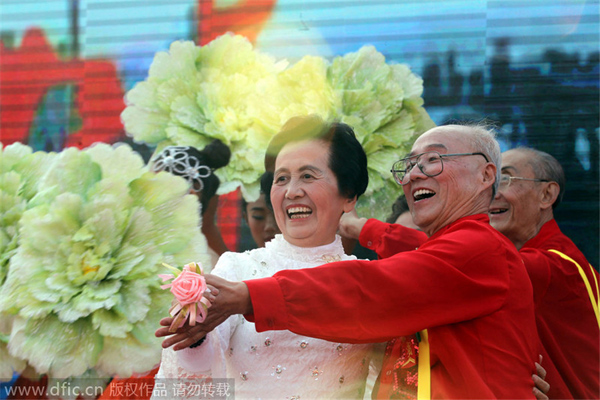|
 |
| Couples dance during an event to celebrate their golden wedding anniversary (50th anniversary) in Rugao city, East China's Jiangsu province, Oct 27, 2014. Hundred couples attended the event. [Photo/IC] |
Emerging Asian nations are finding out what developed ones discovered years ago: Money - and the stuff it buys - brings happiness, or at least satisfaction.
Levels of self-reported well-being in fast-growing nations like China, Indonesia and Malaysia now rival those in the United States, Germany and Britain, rich nations that have long topped the happiness charts, according to a Pew Research Center global survey released on Friday.
It says this shows how rises in national income are closely linked to personal satisfaction.
The pollsters asked people in 43 countries to place themselves on a "ladder of life", with the top rung representing the best possible life and the bottom the worst. Pew carried out the same survey in 2002 and 2005 in most of these countries, enabling researchers to look at trends over time.
But the data also suggest that there is a limit to how much happiness money can buy.
For example, 56 percent of Malaysians rated their lives at "seven" or higher on the ladder, significantly more than the 36 percent in Bangladesh, a poor country. Yet the public in Germany, which has far higher gross domestic product per capita than Malaysia, expressed a life satisfaction level of 60 percent, just 4 percentage points more than Malaysia.
"Money can't secure happiness," said Nguyen Thi Mai, 66, a retired teacher, as she relaxed on a bench overlooking scenic Hoan Kiem Lake in central Hanoi, the Vietnamese capital.
"There are people who don't have any money, but they lead happy lives because family members love and respect each other. But there are rich families where husbands and wives often quarrel and children are addicted to drugs."
While wealth appears to contribute to happiness, other research has indicated it is far from the only factor. Women tend to be happier than men, for example, and unmarried and middle-aged people tend to report lower levels of well-being than married and younger people.
The Pew survey results were based on 47,643 interviews in 43 countries with adults aged 18 and older between March and June. The survey also found that people in emerging and developing economies prioritize a few essentials in life, including their health, their children's education and safety from crime.
Fewer people in those economies said Internet access, car ownership, free time or the ability to travel is very important in their lives.
The survey saw significant gains in personal satisfaction in Indonesia, where 58 percent of those polled placed themselves on the seventh-highest rung of the "ladder of life" or above, up from 23 percent in 2007, and Malaysia, where 56 percent put themselves in that same upper range, up from 36 percent seven years ago.
In Vietnam, which wasn't included in the 2007 survey, 64 percent said they were on the seventh-highest rung or above.
